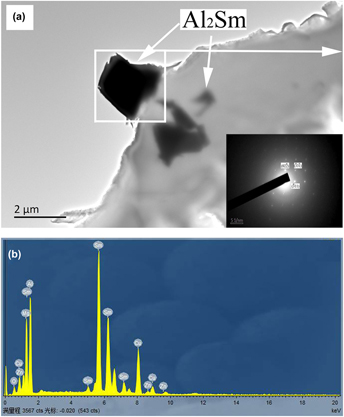Published online by Cambridge University Press: 09 December 2015

In this study, the effects of Sm on the microstructure and corrosion resistance of hot-extruded AZ61 magnesium alloys were investigated by optical microscopy, scanning electron microscopy, and transmission electron microscopy. The results showed that uniformly dispersed Al2Sm particles with size of ∼2 μm were discovered in the hot-extruded AZ61 magnesium alloy sample modified with 1.0 wt% Sm, which promoted dynamic recrystallization grain growth during the hot-extruded process, gradually increasing the grain of the alloy as Sm content increased. The morphology of the corroded surface and the corrosion rate of the hot-extruded AZ61 magnesium alloy both were significantly improved after Sm addition. The alloy sample modified with 2.0 wt% Sm after immersion in 3.5 wt% NaCl solution for 12 h showed minimum corrosion rate value, 3.1 mg/cm2 day, which is only 3.7% of the corrosion rate of unmodified alloy (82 mg/cm2 day).
To send this article to your Kindle, first ensure no-reply@cambridge.org is added to your Approved Personal Document E-mail List under your Personal Document Settings on the Manage Your Content and Devices page of your Amazon account. Then enter the ‘name’ part of your Kindle email address below. Find out more about sending to your Kindle. Find out more about saving to your Kindle.
Note you can select to save to either the @free.kindle.com or @kindle.com variations. ‘@free.kindle.com’ emails are free but can only be saved to your device when it is connected to wi-fi. ‘@kindle.com’ emails can be delivered even when you are not connected to wi-fi, but note that service fees apply.
Find out more about the Kindle Personal Document Service.
To save this article to your Dropbox account, please select one or more formats and confirm that you agree to abide by our usage policies. If this is the first time you used this feature, you will be asked to authorise Cambridge Core to connect with your Dropbox account. Find out more about saving content to Dropbox.
To save this article to your Google Drive account, please select one or more formats and confirm that you agree to abide by our usage policies. If this is the first time you used this feature, you will be asked to authorise Cambridge Core to connect with your Google Drive account. Find out more about saving content to Google Drive.